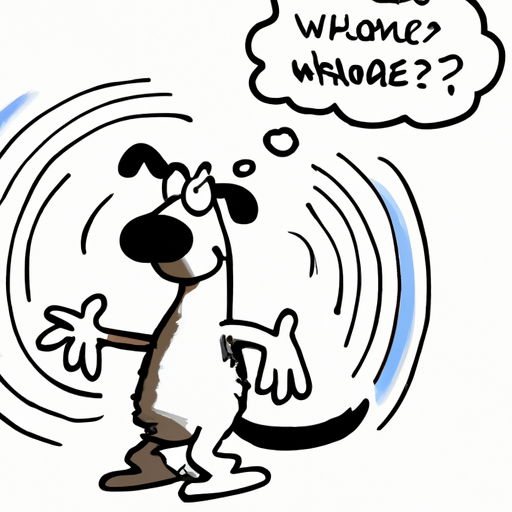As a caregiver for your furry friend, you may have noticed a peculiar behavior: your dog spinning in circles. Why do they do it? Is it normal or should you be concerned? Let’s delve into this fascinating canine habit.
H2: Understanding Your Dog’s Behavior
Dogs, like humans, have their quirks. Spinning in circles is one of these behaviors that might seem strange to us but could be completely normal for them. A dog might spin for a variety of reasons:
- Excitement: When you come home after a long day, your dog might spin in circles out of sheer joy.
- Anticipation: If it’s near walk time or mealtime, your dog might spin while waiting for the leash or food bowl.
- Hunting instincts: In the wild, dogs would trample down grass or snow to create a comfortable spot to rest. This spinning behavior might still be present in domestic dogs.
However, excessive or obsessive spinning could be a sign of a more serious issue.
H2: When Spinning Becomes a Problem
Sometimes, spinning isn’t just a quirky habit, but a sign of distress or health issue. Here are a few reasons why your dog might be spinning excessively:
- Compulsive disorder: Just like humans, dogs can develop compulsive behaviors. If your dog spins excessively without any apparent reason, it could be a sign of a compulsive disorder.
- Neurological issues: Spinning could be a sign of a neurological problem like Canine Vestibular Disease or a brain lesion.
- Physical discomfort: If your dog is spinning and biting its tail, it could be a sign of physical discomfort, such as fleas, allergies, or anal gland issues.
| Possible Cause | Symptoms |
|---|---|
| Compulsive Disorder | Excessive spinning, other repetitive behaviors |
| Neurological Issues | Loss of balance, rapid eye movement |
| Physical Discomfort | Tail biting, scratching, licking |
H2: What Can You Do?
If your dog spins occasionally out of excitement or anticipation, there’s no cause for concern. But if you notice excessive or obsessive spinning, it’s time to take action.
- Observe: Keep track of when and how often your dog spins. This information can be helpful for your vet.
- Consult a Vet: If the spinning is excessive, it’s time to consult your vet. They may need to run tests to rule out any underlying health issues.
- Provide Mental Stimulation: Bored dogs might spin out of frustration. Make sure your dog has enough toys and gets plenty of exercise.
H2: Making Life Better for Your Spinning Dog
Whether your dog’s spinning behavior is a sign of excitement or a symptom of a health issue, as a caregiver, there are ways you can help:
- Provide routine: Dogs thrive on routine. A regular schedule for meals, walks, and playtime can reduce anxiety and obsessive behaviors.
- Offer comfort: If your dog is spinning due to anxiety, comfort them with a soothing voice and gentle touch.
- Enrich their environment: Provide a variety of toys and learning games to keep your dog mentally stimulated.
FAQ
Q: Is spinning normal in dogs?
A: Yes, occasional spinning out of excitement or anticipation is normal.
Q: When should I be concerned about my dog spinning?
A: If your dog is spinning excessively or obsessively, it’s time to consult your vet.
Q: How can I help my dog that spins due to anxiety?
A: Provide a comforting presence, maintain a regular routine, and consider consulting a vet or dog behaviorist.
Remember, as a caregiver, your role is crucial in understanding and accommodating your dog’s unique behaviors and needs.



